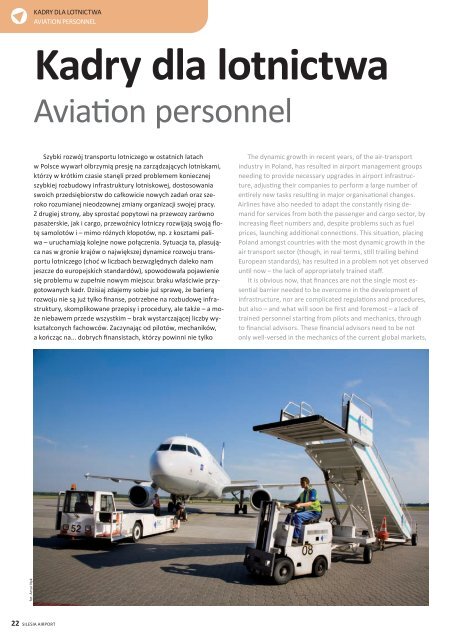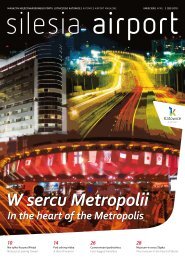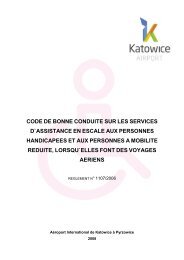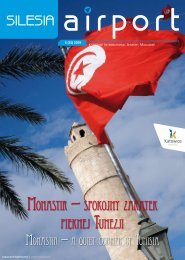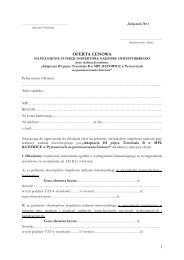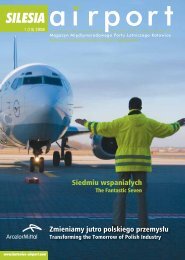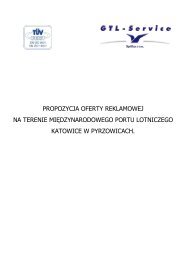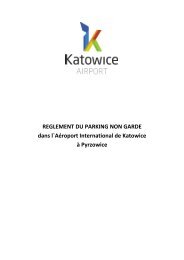Drugie oczy pilota - Katowice Airport
Drugie oczy pilota - Katowice Airport
Drugie oczy pilota - Katowice Airport
Create successful ePaper yourself
Turn your PDF publications into a flip-book with our unique Google optimized e-Paper software.
fot. Artur nyk<br />
KADRY DLA LOTnICTWA<br />
AVIATIOn PERSOnnEL<br />
22 SILESIA AIRPORT<br />
Kadry dla lotnictwa<br />
Aviation personnel<br />
Szybki rozwój transportu lotniczego w ostatnich latach<br />
w Polsce wywarł olbrzymią presję na zarządzających lotniskami,<br />
którzy w krótkim czasie stanęli przed problemem koniecznej<br />
szybkiej rozbudowy infrastruktury lotniskowej, dostosowania<br />
swoich przedsiębiorstw do całkowicie nowych zadań oraz szeroko<br />
rozumianej nieodzownej zmiany organizacji swojej pracy.<br />
Z drugiej strony, aby sprostać popytowi na przewozy zarówno<br />
pasażerskie, jak i cargo, przewoźnicy lotniczy rozwijają swoją flo-<br />
tę samolotów i – mimo różnych kłopotów, np. z kosztami pali-<br />
wa – uruchamiają kolejne nowe połączenia. Sytuacja ta, plasują-<br />
ca nas w gronie krajów o największej dynamice rozwoju transportu<br />
lotniczego (choć w liczbach bezwzględnych daleko nam<br />
jeszcze do europejskich standardów), spowodowała pojawienie<br />
się problemu w zupełnie nowym miejscu: braku właściwie przygotowanych<br />
kadr. Dzisiaj zdajemy sobie już sprawę, że barierą<br />
rozwoju nie są już tylko finanse, potrzebne na rozbudowę infrastruktury,<br />
skomplikowane przepisy i procedury, ale także – a mo-<br />
że niebawem przede wszystkim – brak wystarczającej liczby wykształconych<br />
fachowców. Zaczynając od pilotów, mechaników,<br />
a kończąc na... dobrych finansistach, którzy powinni nie tylko<br />
the dynamic growth in recent years, of the air-transport<br />
industry in Poland, has resulted in airport management groups<br />
needing to provide necessary upgrades in airport infrastructure,<br />
adjusting their companies to perform a large number of<br />
entirely new tasks resulting in major organisational changes.<br />
Airlines have also needed to adapt the constantly rising demand<br />
for services from both the passenger and cargo sector, by<br />
increasing fleet numbers and, despite problems such as fuel<br />
prices, launching additional connections. this situation, placing<br />
Poland amongst countries with the most dynamic growth in the<br />
air transport sector (though, in real terms, still trailing behind<br />
european standards), has resulted in a problem not yet observed<br />
until now – the lack of appropriately trained staff.<br />
It is obvious now, that finances are not the single most essential<br />
barrier needed to be overcome in the development of<br />
infrastructure, nor are complicated regulations and procedures,<br />
but also – and what will soon be first and foremost – a lack of<br />
trained personnel starting from pilots and mechanics, through<br />
to financial advisors. these financial advisors need to be not<br />
only well-versed in the mechanics of the current global markets,


